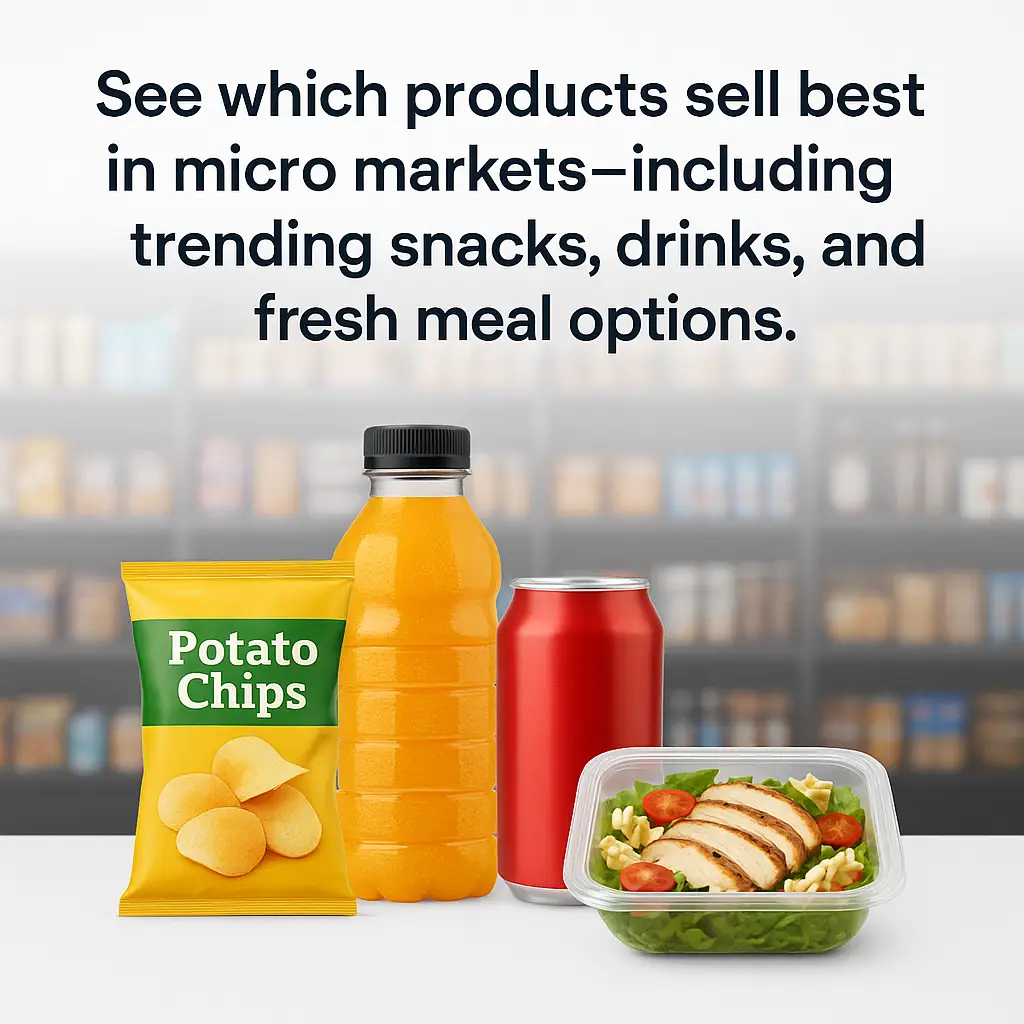Best Micro Market Snacks and Beverages
See which products sell best in micro markets—including trending snacks, drinks, and fresh meal options.
Back to Micro Market Services ResourcesSee which products sell best in micro markets—including trending snacks, drinks, and fresh meal options.
Back to Micro Market Services ResourcesTop-performing micro market products include a mix of healthy, indulgent, and convenient options. Fresh meals, sparkling waters, protein snacks, and recognizable brand chips consistently rank high in office, campus, and residential environments.
![]() Top-selling snacks include protein bars and kettle chips
Top-selling snacks include protein bars and kettle chips
![]() Health-focused items appeal to office and school demographics
Health-focused items appeal to office and school demographics
![]() Category variety boosts engagement and repeat purchases
Category variety boosts engagement and repeat purchases

Choosing the right mix of snacks and beverages is key to making your micro market successful. The best-performing items typically fall into three categories: health-focused snacks, indulgent treats, and grab-and-go meals. Across offices, schools, and apartment complexes, customers consistently lean toward options that offer convenience, variety, and brand familiarity.
Snacks: Protein bars, trail mix, kettle chips, and mixed nuts are top choices for busy professionals and students looking for energy boosts. Individually wrapped baked goods and cookies also perform well, especially when paired with coffee or tea. Variety is essential—mixing sweet, salty, and savory options ensures consistent engagement across different times of day.
Beverages: Bottled water remains the most purchased item, followed by sparkling water and energy drinks. Cold brew coffee, flavored teas, and natural juices are trendy among health-conscious users. Offering low- and no-sugar drink options shows strong performance in workplaces aiming to promote wellness.
Fresh and Shelf-Stable Meals: Micro markets with refrigeration can offer sandwiches, wraps, and salads, which are ideal for lunch and late shifts. Shelf-stable options like ready-to-eat grain bowls or noodle cups provide valuable alternatives in locations with limited delivery access or longer hours.
Smart vending trends also show customers gravitating toward recognizable names, transparent packaging, and products with clean ingredient labels. Contactless checkout options make choosing and purchasing snacks faster and more hygienic, especially in high-traffic environments.
Stocking popular and emerging items not only boosts sales but increases satisfaction among employees, tenants, and students. Markets that refresh their product assortment regularly see increased repeat visits and longer dwell times.
For related insights, explore how office managers enhance workplace satisfaction through vending setups, or read about AI cooler technologies that extend shelf life and reduce waste.
If you're exploring vending options for your business, Vending Exchange can help simplify the process. Delivery, Installation and Equipment is provided at no cost to you - vendors provide the machines, keep them stocked, and handle all servicing. Whether you need a provider or full-service management, just fill out the form on this page to get started.
Protein bars, chips, trail mix, and healthier baked goods are top sellers across locations.
Bottled water, sparkling water, energy drinks, and cold brew coffee are popular beverage choices.
Consider your audience—mix healthy, indulgent, and fresh items based on preferences and usage patterns.
Yes, especially in schools and offices—look for low-sugar, high-protein, or plant-based items.
Yes, they’re ideal for late hours or areas with limited food access and require no refrigeration.
Fresh meals require refrigeration and have a short shelf life; shelf-stable meals last longer without cooling.
Every few weeks—new options keep customers engaged and help identify what's most popular.
Name-brand chips, chocolate, mixed nuts, and protein-based items are consistent favorites.
Yes. Offices prefer energy drinks and coffee; schools and apartments trend towards juices and water.
Smart vending systems provide detailed inventory and sales data for optimizing your item selection.